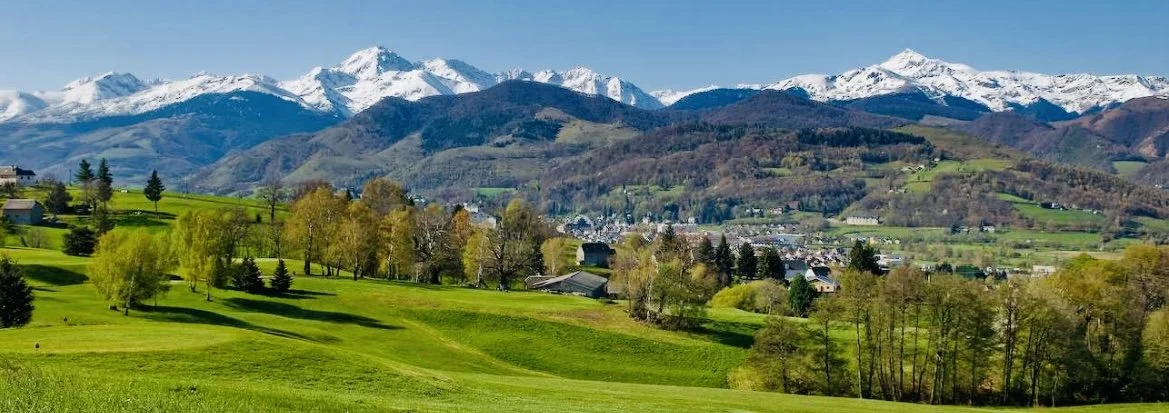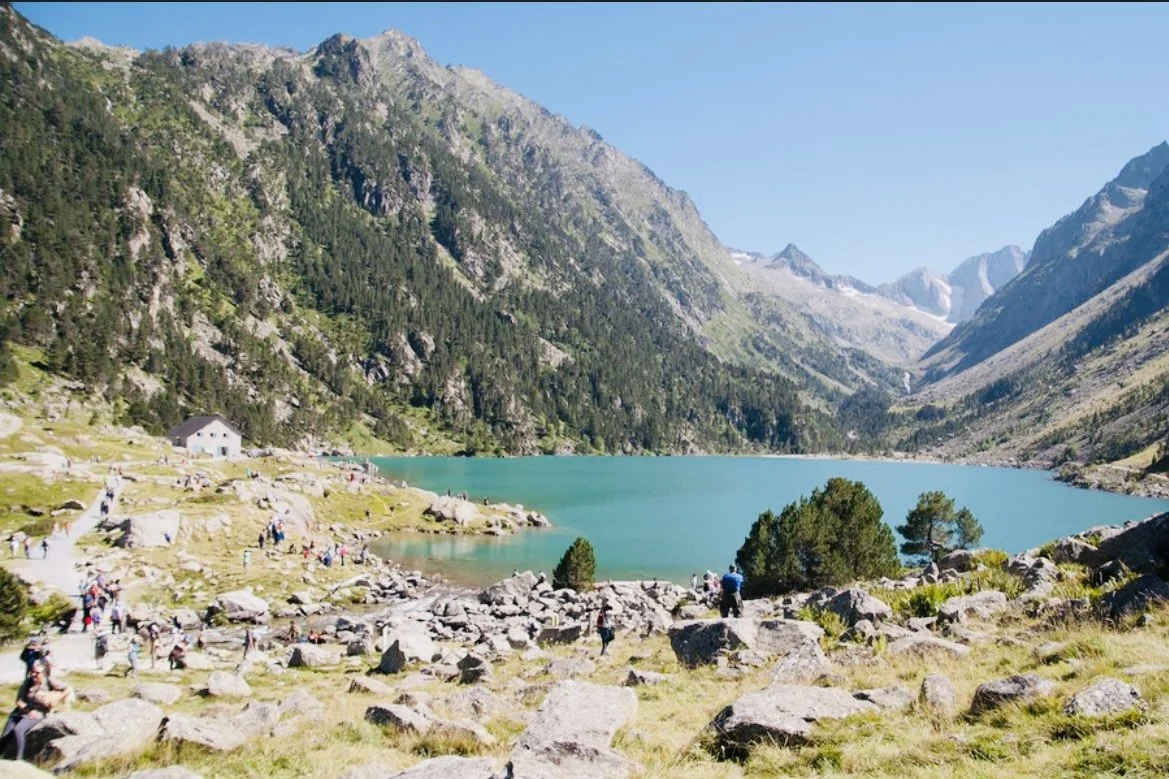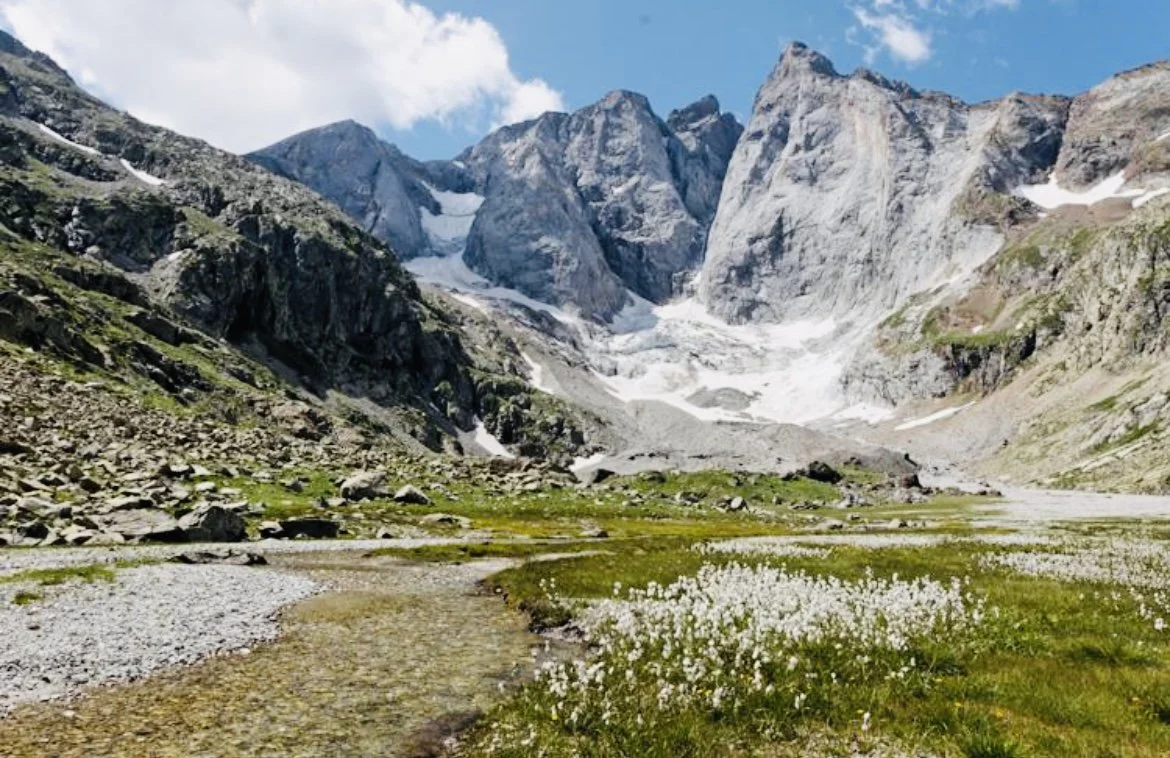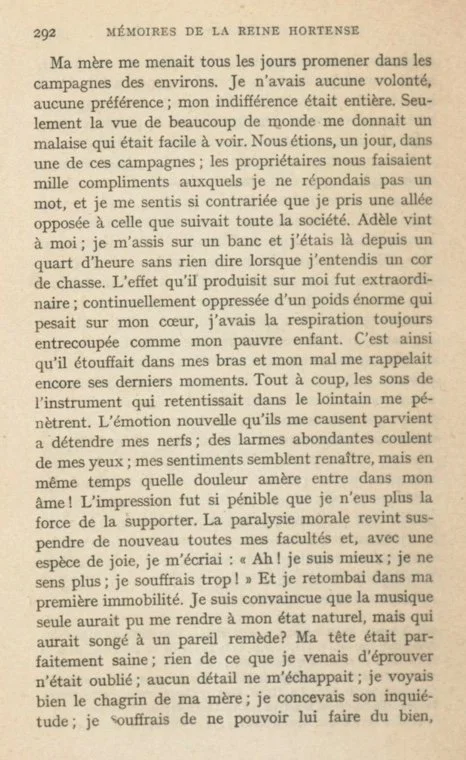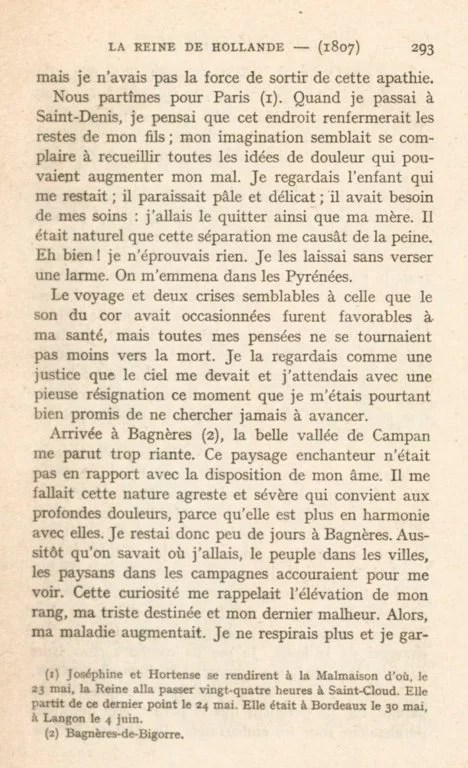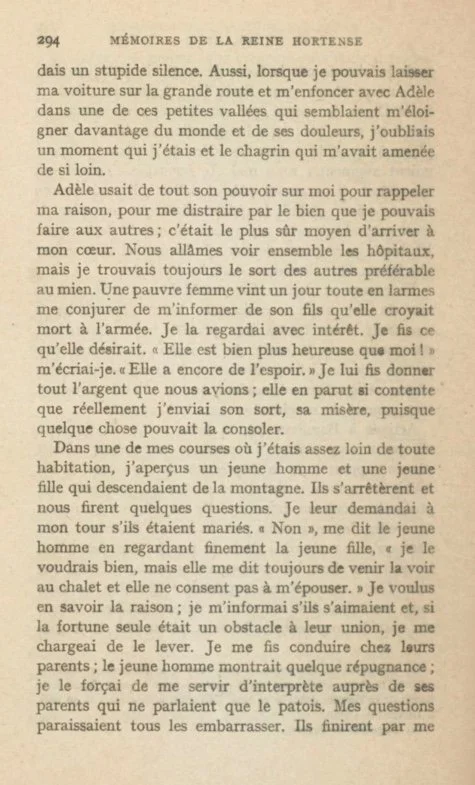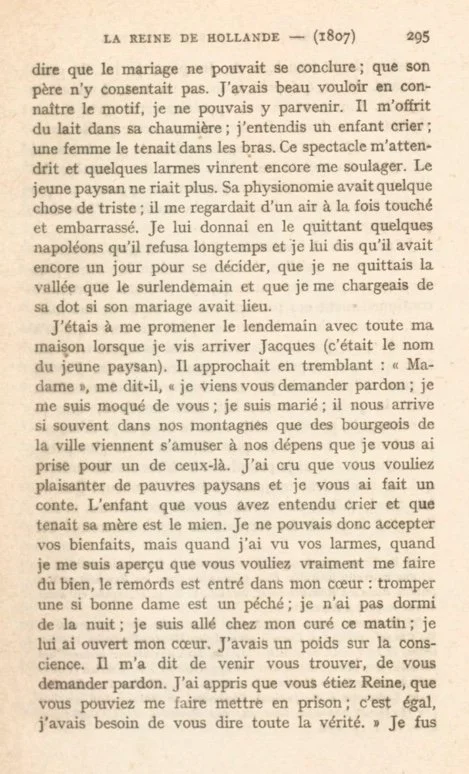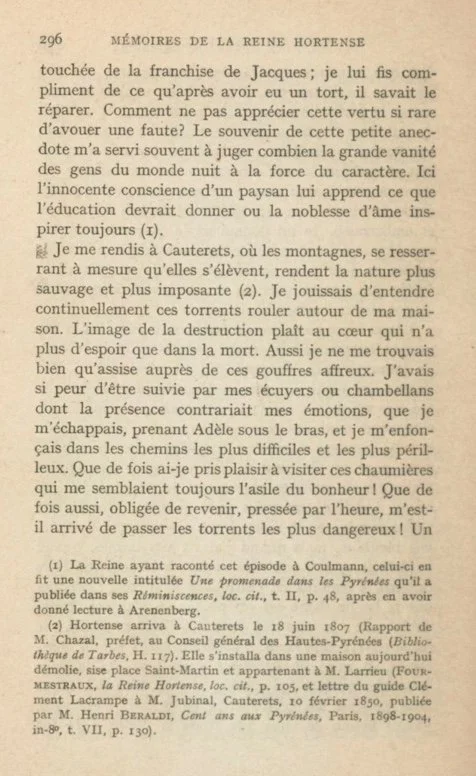Let’s have another look at Hortense’s Memoirs. If you want to read the book it is available for free at the side bar in English and French. Use the widget on the sidebar to translate the text below into pretty much any language.
Hortense’s grief leads her into a journey where she meets someone capable of admitting when he’s done wrong.
Hortense’s memoirs continues:
Adele looked for me and found me seated on a bench. I had been there about a quarter of an hour when I heard the notes of a hunting horn. They had an extraordinary effect on me. Till then I had constantly felt as though some enormous weight were stifling me my breath came in gasps like that of my poor little child.
I seemed to feel him gasping in my arms, and my own sufferings reminded me constantly of his last moments. Suddenly the sound of the instrument that echoed in the distance entered my very soul. The emotion it roused in me relaxed my nerves, abundant tears flowed down my cheeks, my senses seemed to revive, but at the same time how keen a sorrow pierced my heart. The pain was so intense that I could not bear the shock. My moral paralysis returned, checking once more all my natural faculties, and it was with a feeling of relief that I exclaimed:
“Ah, I am better, I cannot feel anything anymore. I suffered so dreadfully." With these words I relapsed into my previous insensibility. I am convinced that music would have restored my nerves to their natural state; but who would have thought to prescribe such a remedy?
My brain was extremely clear, not a detail escaped me. I was entirely conscious of my mother's grief I understood how alarmed she was. It was painful for me not to be able to comfort her, but I had not the strength to overcome my apathy. We left for Paris.
As we passed Saint Denis, I was reminded that there lay the remains of my son. My imagination seemed to enjoy all those ideas which would increase my sorrow. I looked at my remaining child. He was pale and delicate; he needed all my care. I was about to leave him and also say farewell to my mother. This separation did not cause me a single pang. My departure took place without my shedding a single tear. I was taken to the Pyrenees. This trip and two spasms of pain similar to the one I had felt on hearing the hunting horn improved my health.
Yet all my thoughts remained turned toward death. I considered it a gift that Heaven owed me and awaited with a pious resignation that instant of release whose advent I had never expected to try to hasten. When we arrived at Bagnères, the beautiful valley of Campan did not please me. It was too cheerful. This enchanting landscape was not in keeping with my state of mind. What I needed was stern and wild scenery in harmony with profound grief.
Therefore, I only stayed a few days at Bagneres. As soon as my arrival became known people from the neighboring towns and peasants from the surrounding country hastened to come and look at me.
This curiosity reminded me of my rank, my sad fate and my recent misfortune. My health became worse. I could not breathe and I remained dumb. Only when I could leave my carriage on the highway and, with Adele, slip away into one of those little valleys which seemed to offer me a refuge from the world and its troubles, only then was I able to forget for a moment where I was and the misfortune that had caused me to travel so far.
Adele used all her influence to recall my reason, to arouse my attention, by showing me how I could do good to others. This was the surest means of touching my heart. Together we visited the hospitals, but there I found the lot of others preferable to my own.
One day a poor woman came to me in tears and begged me to obtain some information regarding her son who was in the army and whom she believed dead. I looked at her with sympathy. I did what she wanted me to, but I exclaimed, "She is happier than I. She at least has some hope." I gave orders that she was to be given all the money we had with us; she seemed so pleased that I sincerely envied her lot and her poverty, since there was something in the world that could console her. In one of my excursions, when I was some distance away from any human habitation, I caught sight of a young man and a young girl coming down the mountainside.
They stopped, and we asked them some questions. I inquired if they were married. "No," replied the young man, looking earnestly at his companion. "I wish we were. She always tells me to come and see her at the chalet, but will never consent to marry me."
I wished to find out the reason and asked if they loved one another. If it was a question of money that prevented their union, I would undertake to remove this obstacle. I had them take me to see their parents. The young man did so reluctantly. I obliged him to act as interpreter when I spoke to his family, who only spoke the native dialect. My questions seemed to embarrass them all.
They finally declared that the marriage could not take place because the father would not give his consent. Try as I might to discover the reason I could not do so. The young man offered me milk at his cottage.
I heard a child crying as a woman held it in her arms. This sight touched me, and some tears still further relieved my feelings. The young peasant was no longer smiling. His expression had something sad about it. He looked at me with an air that was uncomfortable and sympathetic at the same time.
When I left, I gave him some napoleons which at first, he refused to accept. At the same time, I told him that he still had a chance to make up his mind. I was not leaving the neighborhood till two days later and I would provide the dowry if the marriage took place. The following day while I was out walking with my entire household, Jacques (that was the young peasant's name) came up to me. He was trembling.
“Madame," he said, "I have come to ask your pardon. I deceived you. I am already married. It so often happens that rich city folk come to our mountainside and amuse themselves at our expense that I thought you were like that. I thought you were making fun of us poor country people and I told you a story that was not true.
The child you heard crying and which you saw in its mother's arms is my child. So I could not accept your gifts, but when I saw your tears I understood that you really meant to be kind to us, and I was sorry for what I had done.
To deceive a woman as good as you are must be a sin. I could not sleep all night. This morning I went to the priest. I confessed everything and relieved my conscience. He told me to come and see you and beg your pardon. I hear you are a queen and that you can have me put in prison. That doesn't matter. I feel that I had to tell you the truth."
I was touched by Jacques' frankness. I complimented him on the fact that having done wrong he knew how to make amends. One must always appreciate the rare courage it takes to admit having done wrong. The memory of this little incident has often helped me understand how greatly the pride of fashionable people hampers their force of character. The innocent conscience of this untutored peasant boy had instinctively shown him how to act, as surely as social training or intellectual brilliancy might have done.
I went on to Cauterets, where the mountains, crowding closer together as they increase in height, make the landscape more imposing and at the same time more rugged. I liked the sound of roaring streams dashing continually past my house, for a mind haunted by the thought of death enjoys the presence of destructive forces. That was why I sought continually to approach nearer to these awful chasms.
The original French is available below:



